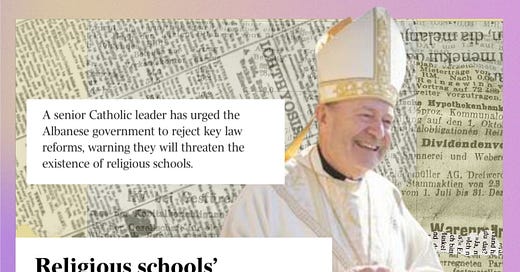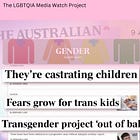Why is the government still bending to the will of a few conservative faith leaders when it comes to protecting LGBTQIA+ students in religious schools?
The public supports removing Article 38. Politicians support the changes. And the legal system supports the changes.
Woah, who would have thought? It’s The Australian posting another puff piece stressing the bigoted perspectives of a high-ranking clergyman,proclaiming “a most serious threat to the exist of our schools our ability to provide such educations”.
The article I’m referring to is headlined Religious Schools’ Existence ‘in Danger’ by Dennis Shanahan and Joe Kelly. This article summarises an interview with Julian Porteous, Archbishop of Hobart about his opinions about the reintroductions of the proposed changes to the Sex Discrimination Act (1984) in Federal parliament. To most this may seem simply a presentation of the opposing facts, a healthy debate.
I’m here to show you how this man’s argument and the fact it was allowed be published is both disingenuous and dangerous.
Outdated laws
First we must go back to 2017, the year heralding Pepsi-gate, the return of Taylor Swift with reputation, and same-sex marriage finally being legalised in Australia. It was also the year that politicians became mildly aware of the anachronism of our laws protecting against discrimination.
Under the current laws of the Sex Discrimination Act (1984), it is deemed illegal to discriminate on the basis of gender, sexuality, pregnancy, and relationship status. However, Article 38 was made at the time allowing religious educational institutions to be exempt from this law for purposes of religious freedom.
In essence, religious schools, which account for approximately 30% of all Australian schools can hire, fire, or control enrolment for anyone they deem undesirable. It’s a blank hall pass for discrimination.
After becoming aware of this exemption, public opinion polls showed that most Australians (74%) thought that these laws needed to change. The vibe from within parliament was the same, with a vocal majority arguing it handed too much power to religious institutions. Even legal experts overwhelmingly supported the revision of these laws, claiming they are now archaic.
However, due to the pressure from Evangelical, Muslim, Anglican, and Catholic “faith leaders” , Morrison government halted changes until further notice. In 2019, government commissioned the Australian Law Reform Commission (ALRC) to investigate and find a compromise. In late 2023, the report was finalised and released to the public. Can you guess what their recommendations were? You guessed it: change the laws to remove a blanket exemption from the rules and be on par with all other educational institutions.
They also noted that keeping the exemption could result in “tangible harm (such as loss of employment, and economic or social disadvantage) as well as intangible harm (such as undermining a person’s sense of self‑worth, equality, belonging, inclusion, and respect)”.
We could argue the legal merits of the changes all day, but this has already been repeatedly done. The worst part of this debate is the lack of lived experience. These changes to the laws are there to protect the wellbeing of youth and staff who are or might be subjected to discrimination.
I definitely haven’t heard of young, queer students or staff and how this might affect them. Instead, I’ve heard Journalist Bernard Keane harping on about essential medical and psychological services in the UK, ultimately leading to barriers to their access. I too often hear J.K. Rowling and her historical revisionism because she's bored and way too rich. I hear local members politicking about pronouns, sports, and toilets, instead of discussing what this whole law reform is about: young people.
We know that young people are becoming increasingly understanding and destigmatized about their gender and sexuality, leading them to express themselves to those they care for. Why must they feel like they cannot do this in a setting that is supposed to cultivate their mind? No wonder these young people are substantially more vulnerable to self-harm, abuse, bullying, Ill mental health, and even suicide than their heterosexual counterparts. It seems to me that those who loudest about these young people actually care the least.
My own Porteous
I find it very hard to believe that Archbishop Porteous has the children’s best wishes at heart. In 2018 I was lucky enough to meet my own version of Porteous: Dr Glenn Davis.
For context, during this heated debated about the proposed laws, a few alumni and I discovered our school had cosigned a letter with thirty-three other Anglican schools which demanded the government leave exemption 38 alone. As innocent as it seemed, most of us had witnessed discrimination within our schools firsthand and felt compelled to speak up. My former school even made headlines a year later for its own its own sexist scandal. We called the school principals out, demanding that they prioritise their students over their own fear of losing control. The community response was amazing, with around 3000 other ex- and current students cosigning.
Unfortunately, I only received one response from the 34 schools I approached. It also wasn’t from a principal, but instead the Anglican Archbishop of Greater Sydney, Dr Glen Davis. I was terrified, an idealistic twenty-something student taking on a religious leader with a PhD in law. I was hopeful, thinking perhaps he would apologise to the community. Your boy was naïve.
Instead, the meeting proceeded with him blaming me reputational damage and uproar to the schools under his dominion. He demanded that I publicly retract my claims. I did not. Instead I retold the whole experience in an opinion piece in the Sydney Morning Herald. After our meeting, Glenn Davis continued his anti-queer tirade, pressuring Anglicans who ordained same-sex marriages to leave the congregation.
Eventually he splintered from the mainstream church due to its lack of conservativism. In the end, he didn’t care about the students, he cared about his politics.
Egos and conservatism
Julian Porteous fits the mould. Throughout the article he leverages the concepts of “diversity” and “multiculturalism”, claiming that threats to religious freedom is a threat to diversity. He shows contempt for the impartial decision made by the head of the Australian Law Reform Commission, Judge Stephen Rothman. And he also tries to elicit an emotive story to place himself and his institution as the victim. His power is undeniably disproportionate to a gender-diverse teenager and he knows it. This power has been used for years to halter progression within the church.
A quick scroll finds quite a few articles in the Australian from this man - it’s hard to believe it, but this article says more about the Australian newspaper than it does about the man. Porteous is constantly spouting problematic rhetoric, but by commissioning him, so are the editors of the paper. Never have I seen a media outlet so obsessed with marginalising young people based on their sexuality.
The question is, is it Porteous who cares about this change, or is The Australian fighting for its relevance?
-
Max loomes is a writer, researcher, and psychologist out of Sydney Australia. He has a strong interest in social justice and self-determination.
—
The LGBTQIA+ Media Watch Project is partially funded by The Walkley Foundation, and proudly pays queer writers, journalists and experts to write about LGBTQIA+ representation in media and culture. To support writer-owned, independent, queer-led media, please consider subscribing - this is how we pay our writers!








